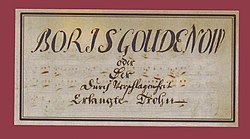Boris Goudenow
| Work data | |
|---|---|
| Title: | Boris Goudenow or The Throne Acquired by Cunning or The Honor Happily Linked to Inclination |

Title page of the score from 1710 |
|
| Original language: | German |
| Music: | Johann Mattheson |
| Libretto : | Johann Mattheson |
| Premiere: | January 29, 2005 |
| Place of premiere: | Hamburg |
| Playing time: | about 3 hours |
| Place and time of the action: | Moscow , 16th century |
| people | |
|
|
Boris Goudenow or The Throne Obtained Through Cunning or The Honor Happily Linked to Inclination is an opera in three acts by Johann Mattheson . The opera was written in 1710, but was not given a concert premiere until 2005 in Hamburg .
Origin and rediscovery

Mattheson originally wrote the opera for the opera house on Gänsemarkt in Hamburg, where his operas had been performed in previous years. Mattheson took the material for this from a book by Peter Petreus (or Petrejus), who published his Regni Muscowitici Sciographia in Swedish in Stockholm in 1615 and then translated it into German himself for publication in 1620.
In October 1710, Russia wanted to set up a trading and observation center in Hamburg. a. should report what was happening in northern Germany and whether Hamburg newspapers were not printing any unpopular news about Russia. In consideration of diplomatic entanglements, since the Comerz deputation from Hamburg only sought contact with the recently completed Saint Petersburg in December 1710 , the opera was probably not performed, the score and libretto disappeared in the archive.
Due to relocation and fire losses during the Second World War, most of the music and text books of the Hamburg Opera seemed to be lost, until in 1998 a bundle of Hamburg music manuscripts from Armenia returned to the State Library . It contained a number of pieces by Mattheson's hand, including the score of the opera Boris Goudenow , which was discovered by the Altona church musician and music researcher Johannes Pausch. The opera was premiered in concert on January 29, 2005 in Hamburg's Bucerius Kunst Forum and staged for the first time on June 18, 2005 in Boston .
The subject was taken up again in 1870 in the opera Boris Godunow by Modest Mussorgsky .
action
The scene of the action is the Moscow Kremlin . The plot of the opera revolves around the story of how the Russian prince Boris Goudenow comes to power through intrigue and becomes the Russian tsar .
first act
The sick tsar Theodorus summons the Privy Council and declares Boris Goudenow governor of Moscow. But he does not manage to find a successor.
Second act
He resigns Goudenow and goes to a monastery with his sister, the former Tsarina Irina. Boris' enemies at court seem to be gaining the upper hand. A delegation sets out to get Boris to return.
Third act
Goudenow returns and in the end is not only the savior of the fatherland, but also a patron of lovers. He is feared and honored but not loved.
literature
- Walter Schulze: The sources of the Hamburg Opera (1678-1738) , Stalling, 1938, p. 88.
- Dmitrij Tschižewskij: An opera "Boris Godunov" from the 18th century in Zeitschrift für Slavische Philologie , Vol. 30, No. 2, Universitätsverlag Winter, Heidelberg, 1962, pp. 237–242.
- Paul O'Dette, Stephen Stubbs, Jörg Jacobi: Boris Goudenow or The Throne Through Deviousness or The Honor Happily Associated with Inclination , (score), Boston Early Music Festival, Cambridge, MA, 2004.
- Concerto: Das Magazin für Alte Musik, Volume 21, 2004, p. 9.
Web links
- Opera website
- Article in the New York Times
- Article in the world
- Performance of the opera as part of the Early International Music Festival 2007 in St. Petersburg on www.youtube.com
Individual evidence
- ↑ Yuta Kikuchi: Hamburg's Baltic Sea and Central Europe Trade 1600–1800: Exchange of Goods and Hinterland Networks , Böhlau, Cologne, 2018, p. 173.